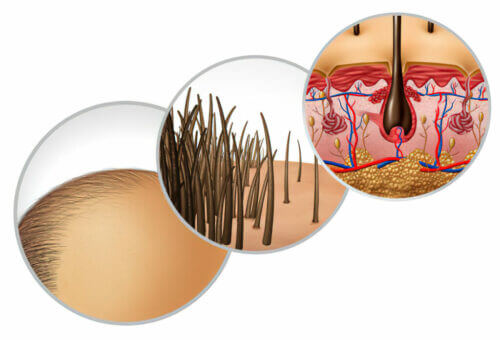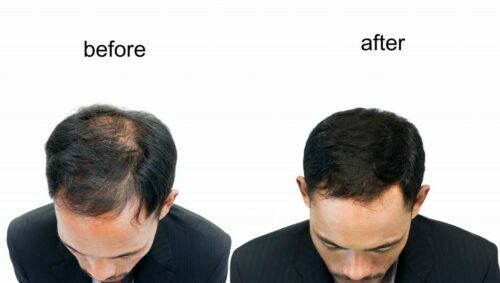Hair loss is something nobody wants in their life. And when it starts affecting your confidence and self-esteem, it becomes a distressing experience. Thanks to science and technology, we now have alternatives to deal with hair loss.
A hair transplant is a popular and effective solution to restore hair growth and improve appearance. But like any other medical surgery, one must prepare and plan to achieve the best possible results.
This guide will provide tips and advice on preparing for hair transplant surgery, allowing you to feel confident and ready for your upcoming hair transplant procedure.
What is Hair Transplant Surgery?
Hair transplant surgery involves shifting hair to bald or thinning areas of the scalp. It is usually suitable for people undergoing other hair loss treatments. This surgery is also known as hair restoration or hair replacement. Most dermatologists or plastic surgeons perform hair transplants in their medical offices under local anesthesia.

FUE Hair Transplant
Follicular Unit Extraction (FUE) hair transplants are done by removing individual hair follicles from your skin and implanting them on other body parts where hair is absent or thinner. FUE is often performed over several days in a series of 2 to 4-hour sessions; patients can go home after the procedure. Outcomes are visible after three to four months.
What to avoid before a hair transplant?
If you are undergoing hair transplant surgery, it is a great idea to consult your doctor and take his suggestions on whether you need to stop any specific medications before a hair transplant.
- Your doctor may advise you to avoid aspirin or anti-inflammatory medication as they can make your healing procedure more difficult after the surgery. Similarly, you may be asked to avoid blood thinning pills or antidepressants as they can also impact the healing process.
- You must stop smoking for two weeks before the surgery to get the best results. Also, you must avoid alcohol consumption before the transplant because alcohol expands blood vessels, which causes an increase in swelling at the location of the incision.
- It is recommended to refrain from cutting hair before a hair transplant surgery. It becomes important, especially when your donor areas are already short. To ensure that your hair is the ideal length for transplanting, your surgeon will trim it during the operation; so that too short hair does not complicate the process.
What Happens During the Hair Transplant Procedure?
An area of your head is numbed by a local anesthetic after a surgeon has properly cleaned your scalp.
In follicular unit extraction (FUE), the hair follicles are directly obtained from the back of the head through tiny punch incisions. Here is a step-by-step FUE hair transplant procedure:
- In the hair transplant receiving area of your scalp, the surgeon usually makes tiny holes using a blade or needle. Generally, hair is placed in these holes.
- A surgeon may transplant hundreds or even thousands of hair in a treatment session.
- After that, your scalp will be covered for a few days by the graft, gauze, or bandages.
The hair transplant session can last up to 4 hours or more, and about ten days after surgery, your stitches will be removed. It may take three to four sessions to achieve a head full of hair as desired.
Hair Transplant Before and After

What To Do After a Hair Transplant?
Similar to other surgical procedures, taking all the necessary precautions after a hair transplant surgery is crucial. Post-hair transplant, you will likely feel some tenderness in the scalp for a few days.
The doctor will often prescribe pain drugs in addition to antibiotic medicines and anti-inflammatory meds. As part of proper post-hair transplant care, avoiding touching the recipient area and taking the prescribed drugs is crucial.
Other important postoperative instructions include the following:
- Avoid sleeping flat: Patients may develop postoperative edema at the surgical site, similar to other surgical procedures. As a result, the patient should sleep with their head elevated at a 45-degree angle for the first seven days following the hair transplant surgery. This type of sleeping reduces swelling, which speeds up the healing process of wounds.
- Avoid hair wash: a hair wash is a strict no during the first 48 hours. Gentle hair wash will be fine on the third day. Don\’t squeeze the shampoo straight onto the scalp; use a gentle shampoo. Instead, take a cup of shampoo and use your hands to massage the scalp gently. Do not rub or scratch excessively.
- Avoid ice and sun directly to the scalp: Do not apply ice directly to the areas of your scalp with transplanted hair. You can touch your scalp extremely carefully and only if necessary after 72 hours. Apply conditioner to a scratchy scalp instead of scratching at it. Avoid placing the scalp in the sun between 10 AM and 2 PM for the first two weeks following your hair transplant surgery.
- Avoid strain and sweat: Do not exercise vigorously, swim, lift heavy objects, or undertake any other strenuous activities for the first seven days after the treatment. All of these activities cause excessive sweating, which also affects the scalp.
- Avoid alcohol consumption, smoking and any pain medications.
- After the hair transplant surgery, you shouldn\’t exercise or do anything physically demanding for at least a few weeks.
- Administer the recommended oral medications at the appropriate intervals.
Conclusion
To sum up, planning and preparing for hair transplant surgery is necessary. It is crucial to speak with a qualified hair transplant surgeon, get a physical exam, quit smoking, abstain from blood thinners and alcohol, make travel arrangements, and make postoperative care plans.
Following these steps, you can ensure a successful outcome and get the full benefits of hair transplant surgery. Be sure to communicate any queries or worries with your hair transplant surgeon.
FAQs
How painful is a hair transplant?
Ans: No, a hair transplant is not painful, thanks to local anesthetic and postoperative painkillers. However, patients may experience a brief temporary level of discomfort. Hair transplant surgery is mostly a pleasant and pain-free experience.
What is the success rate of hair transplant surgery?
Ans: Before getting a hair transplant, people should carefully consider the success rate. India has a 98% success rate in hair transplants, which is impressive.
How much does a hair transplant procedure cost in India?
Ans: The typical price range for a hair transplant in India is INR Rs. 57,633, with the highest cost reaching up to INR Rs. 2,65,000.
